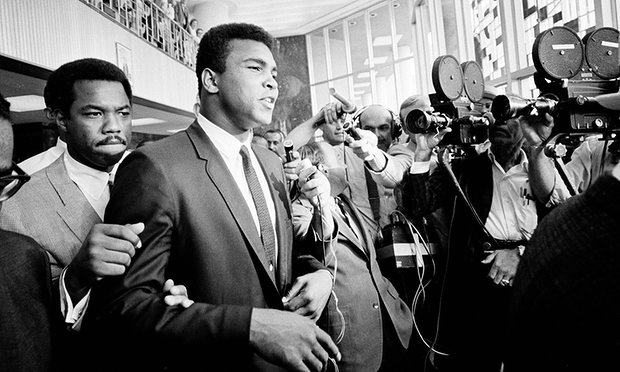PR and marketing professionals can learn many lessons from boxing great Muhammad Ali, who passed away last Friday. Most have nothing to do with boxing. The key lesson: Always remain true to your core values.
After winning an Olympic gold medal in boxing at the 1960 Olympics in Rome as an 18-year old amateur, Ali – then known as Cassius Marcellus Clay — defeated Sonny Liston in 1964 to become heavyweight champion of the world. A short time later he changed his “slave name” to Mohammad Ali and joined the Nation of Islam, often labeled as a black supremacist and separatist movement.
Unlike earlier African-American boxing champions such as Joe Lewis, Archie Moore and Ezzard Charles who were deferential to white authority and reticent in public, Ali was outspoken, boastful and seemingly contemptuous of authority. Then at the height of the Vietnam War and the height of his boxing prime in 1967, he created much more controversy when he refused to be drafted into the U.S. military. Many other members of the Nation of Islam also refused induction, including its leader.
Ali’s much-quoted explanation of his position was: “I ain’t got no quarrel with the Viet Cong … No Viet Cong ever called me nigger.” Stating his convictions he said: “My conscience won’t let me go shoot my brother, or some darker people, or some poor hungry people in the mud for big powerful America. And shoot them for what? They never called me nigger, they never lynched me, they didn’t put no dogs on me, they didn’t rob me of my nationality, rape and kill my mother and father. … Shoot them for what? How can I shoot them poor people? Just take me to jail.”
At a time that was filled with civil rights marches, he was alluding to the on-going oppression of people of color in America, especially in the Deep South.
He was arrested for draft evasion, found guilty and stripped of his boxing title.
Ali’s words and actions made him an icon of both the civil rights and antiwar movements, but he also faced an enormous backlash and was often lambasted as a traitor. The State Department revoked his passport so that he couldn’t pursue his boxing profession outside the country.
He appealed to the U.S. Supreme Court. The court overturned his conviction in 1971, but he had lost nearly four peak years of his boxing career. Throughout the appeal process, he was outspokenly firm in his antiwar, religious and civil rights positions.
Suffers Intense Criticism
When he returned to boxing in 1971, he lost the title bout to reigning heavyweight champion Joe Frazier.
“After he was reinstated as a professional boxer three and a half years later, he had lost much of his youthful agility. Yet he’d never given in,” wrote Joyce Carol Oates in The New York Times. Later, Ali defeated Frazier in a brutal match to again become the world heavyweight champion. In his professional boxing career, Ali had 56 wins, 5 losses, 37 knockouts. He won the heavyweight championship three times.
Throughout, he kept his convictions. “The heart of the champion is this: One never repudiates one’s deepest values, one never gives in,” Oats observed.
Ali was diagnosed with Parkinson’s syndrome in 1984, a disease that sometimes results from head trauma from activities such as boxing. Throughout his illness, he continued to make public appearances advocating for his convictions on religion, race, freedom and justice.
PR & Marketing Lessons from Ali
Ali was among the first, and arguably the greatest, of the self-promoters and trash-talkers. Ali taught many lessons applicable to marketing and public relations. The principles can be applied to corporations, not-for-profit organizations and individuals:
1. Identify your core values and convictions. Live them every day. Proclaim them.
Ali’s platform consisted of freedom from racism and oppression, justice for the poor and people of color, strict discipline in professional training, and bold strategies. He proclaimed and acted on all of them during and after his professional career until his death last week.
2. Aggressively defend your positions and convictions.
Many people, including many in the media, refused to accept Ali’s religious-based decision to change his name. Many also didn’t respect his decision to refuse military induction based on his religious and civil rights convictions. Ignoring or refuting criticism, Ali kept championing (pun intended) his positions.
3. Be bold in your product positioning and claims. Prove it.
Ali’s self-proclaimed positioning was: “I am the greatest.”
As Ali said: “It ain’t braggin’ if you can back it up.”
He also commented: “Braggin’ is when a person says something and can’t do it. I do what I say.”
Recommended for YouWebcast: Hacking SEO: The Fastest Way to Double Your Rankings in 90 Days
4. To gain market awareness, be bold and brash.
From his earliest appearances as Cassius Clay, Ali was known as the “Louisville Lip” for his outspoken ways. It earned him initial media attention. He kept attention focused on him through his continued unexpected pronouncements and by winning championships.
5. Communicate with simple, catchy, and quotable phrases.
Ali spoke a musical cadence and often used doggerel or rough poetry.
Example: “He will be mine in round 9.
If he makes me sore, I’ll cut it to four.
If that don’t do, I’ll get ‘em in two.
If he run, we’ll get ‘em in one.”
Here are a few of Ali’s best quotes:
“Float like a butterfly and sting like a bee.”
“He who is not courageous enough to take risks will accomplish nothing in life.”
“It isn’t the mountains ahead to climb that wear you out; it’s the pebble in your shoe.”
“Don’t count the days. Make the days count.”
“Service to others is the rent you pay for your room here on earth.”
“A man who views the world the same at 50 as he did at 20 has wasted 30 years of his life.”
“Hating people because of their color is wrong. And it doesn’t matter which color does the hating. It’s just plain wrong.”
“Live everyday as if it were your last because someday you’re going to be right.”
Ali’s quotes shouldn’t just be read. You need to hear them to get a full sense of their impact.
6. Develop a good strategy.
In his early years, Ali won bouts because of superior speed, power and skill. After the three years of not fighting, however, his skills diminished and he had to use a more strategic approach to each fight. He developed the rope-a-dope and other techniques to compensate for his waning skills. He also moderated his public shtick, often giving thoughtful speeches.
7. Position, reposition, miss-position and confront competitors to gain advantage.
Ali was a pioneering master at getting into the heads of competitors.
“Liston will fall in eight to prove that I am great.” said Ali in 1964 of heavyweight champion Sonny Liston. Before the bout, Ali taunted him as the “Big Ugly Bear.” Ali said of Liston: “He’s too ugly to be world’s champ. The world’s champ should be pretty like me.” Liston didn’t come out for round 7, retiring on his stool.
Of Buster Mathis, Ali said: “I will do to Buster what the Indians did to Custer.”
Joe Frazier refused to acknowledge Ali’s new name, insisting on calling him Cassius Clay (as did many publications including the New York Times). At the weigh-in for the heavyweight championship, Ali taunted Frazier with “What’s my name?” using him as a foil for everyone who would not adopt Ali’s chosen religious name and telling Frazier that he would force him to speak the right name after Ali won. Ali also taunted him with “What’s my name?” at the end of rounds during the fight. Ali won. Frazier, most all publications, and indeed the whole world, came to call him Mohammad Ali. Many even acknowledged him as “the greatest.”
8. Be accessible. During training, Ali invited the press and public to his workouts. He was readily available to the press for interviews. Most days he had a quotable quip. He also attended and spoke at many public events, including many black-tie events.
9. Repetition works. Ali repeated the same catch phrases over and over again. He reiterated his civil rights messages at most every opportunity in both formal and informal settings.
10. To become wise, seek to understand techniques, but mostly seek to understand yourself and your convictions. One of Ali’s strengths was his understanding of the techniques of boxing. He also became a devout student of Islam.
“His dedication to his craft, his confidence in himself and, most importantly, his courageous fight to stand up for his values, faith, and morals were all things that I needed to emulate,” life coach and business consultant Nia Jackson writes in The Cauldron, for Sports Illustrated. “Over the course of many years, he committed time to understanding himself, his faith, and his role in the world,” she writes. “The result of this dedication was the evolution of quite a wise man.”
As Jackson advises, “Let’s remember Ali as evidence that we can change lives, open hearts, and unite the world just by being true to yourselves and what we believe.”
Bottom Line: The life of Muhammad Ali shows the importance of being true to your values. Core values must be an integral part of your message creation process. Ali’s ground-breaking media relations and communications methods also inform today’s PR and marketing.
This post was originally published on the CyberAlert blog.






























